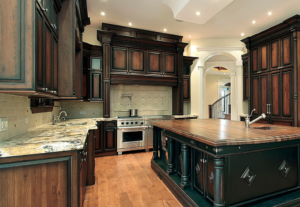
If you’ve ever been faced with having to choose a kitchen countertop material, you know it can be a confusing process, and it can be even more perplexing when you have to determine which type of countertop is going to last the longest. For many homeowners, granite comes to mind as a natural stone material that would be lasting, so how would they come to that conclusion? Well, here are some likely reasons why granite has earned that distinction.
Hard and Resistant
It’s pretty much been shown that granite is hard as well as dense. Hardness and denseness are indicators of longevity. With granite consisting of varying minerals, some slabs can be harder than others. On the Mohs Scale of Hardness, designed to indicate the strength, hardness and resistance to scratches for different minerals, the scale is set at 1-10. A one (1) indicates softer materials while the ten (10) indicates the hardest of materials. Granite comes in at between 6.0 to 7.00 on the scale. Other average countertop surface materials are not exactly in the same league as granite concerning their strength and hardness factors. For example, different grades of marble can rate from three (3) to five (5) on the scale, making it less durable than granite.
Longevity also plays a part in a stone’s resistance. Granite is resistant to damage because of its hardness, which makes it less likely to experience scratches and cracks that can weaken countertops.
Countertop Materials Comparison
In comparison to other countertop materials, granite has the capacity to last longer than other materials. Most granite and other natural stones can last anywhere from 100 years or more; whereas marble countertops last an average of 20 years. Tile, if properly cared for and maintained will also last for 100 years and beyond. Laminates, though handy for use and less expensive than other materials, will only last 20 to 30 years.
Increasing Longevity
Granite requires limited maintenance and upkeep. Cleaning doesn’t have to be a constant challenge when you have granite countertops, as they can withstand everyday wear and tear, but countertops shouldn’t be totally neglected as problems can, and likely will occur, particularly with stains.
In order to increase the longevity of granite countertops, there are preventative measures to assure that they last. With granite, utilizing sealants is important, as granite is a porous material and is susceptible to stains from juices, wine, oil and other food substances. Sealing is essential to prolong the life of granite. Any major stains can be difficult to remove and without periodic sealing, any previous sealant will probably wear away and the granite will weaken. This will set up granite countertops for absorption of stains. Also, lower quality granite can be affected by the growth of bacteria and if a sealant is improperly applied, any bacterial growth could increase.
Cleaning and Cautionary Care
In spite of granite’s easy care, keeping it clean is definitely a simple way to extend its longevity. A soft cloth and warm water is a start, and a cleaner made specifically for granite would also be of help. Everyday cleaners should be avoided, particularly those that are abrasive, as they can wear away at any sealant and leave countertops open to stains and damage.
Protecting granite from possible damage is another way to add to its longevity. A word to the wise is caution. Keep any super heavy objects away from granite as they can cause cracks or dents if they happen to fall, which can ruin entire areas of a countertop. You may be looking at replacement if care and caution are not considered. In addition, when preparing food on granite surfaces, be sure and use a cutting board to prevent any possible scratches or stains. Though granite is resistant to heat, it is also important to use trivets or pot holders for placement of hot cookware or casserole dishes on it. Staining and damage can occur from extremely hot sources that are allowed to be continually placed in the same area on a countertop.
Proper initial installation of granite is also important to its longevity. Installers should be prepared to utilize the right support systems in order to properly hold granite in place, as it is heavy and will require bolstering to keep it positioned during installation.
In order to insure that the granite you choose is going to last, be sure to research the strength, density and consistency of any slab that you consider. If you aren’t exactly sure how to evaluate those aspects of granite, complete the online contact form and a granite expert will get back to you with the information you need to make an informed decision.






